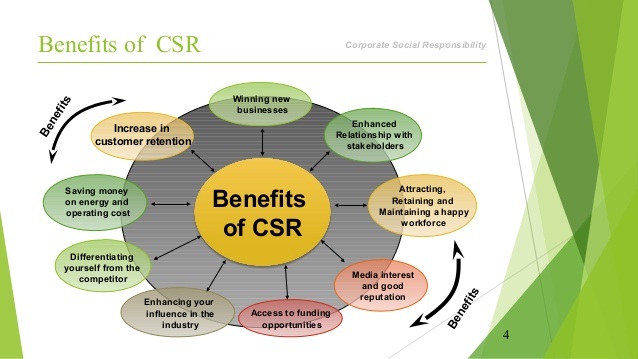Benefits of Corporate Social Responsibility (CSR)
Corporate Social Responsibility (CSR) refers to a company’s commitment to operating ethically and responsibly while considering the impact of its actions on society and the environment. In recent years, CSR has gained significant attention as businesses recognize that their success is intertwined with the well-being of the communities they operate in. This article explores the numerous benefits of CSR and highlights its importance in today’s business landscape.
Enhanced Brand Reputation
One of the key benefits of CSR is the enhancement of a company’s brand reputation. By actively participating in initiatives that promote social and environmental well-being, businesses can build a positive image in the eyes of their stakeholders. Consumers are increasingly conscious of the ethical practices of the companies they support, and a strong CSR program can attract and retain customers who align with the company’s values.
Improved Employee Engagement
CSR initiatives can also have a profound impact on employee engagement. When employees see their organization actively contributing to social causes, they feel a sense of pride and purpose in their work. This, in turn, leads to higher job satisfaction, increased loyalty, and improved productivity. Companies that prioritize CSR often experience lower turnover rates and find it easier to attract top talent.
Positive Public Relations
Engaging in CSR activities provides companies with opportunities for positive public relations. By supporting causes that resonate with the public, businesses can generate media coverage and gain exposure. This can help in building relationships with key stakeholders, including customers, investors, and the local community. Positive public relations can also act as a buffer during times of crisis, as companies with a strong CSR track record are often perceived as more trustworthy and reliable.
Stakeholder Trust and Loyalty
CSR initiatives play a crucial role in building trust and loyalty among stakeholders. When companies demonstrate a commitment to social and environmental responsibility, they establish themselves as reliable and ethical partners. This fosters long-term relationships with customers, suppliers, employees, and investors, who are more likely to support and advocate for the company. Trust and loyalty are invaluable assets that can contribute to a company’s sustained success.
Cost Savings and Efficiency
Implementing CSR practices can lead to cost savings and improved operational efficiency. By adopting sustainable practices, companies can reduce energy consumption, minimize waste, and optimize resource allocation. These measures not only benefit the environment but also result in financial savings. Additionally, businesses that prioritize employee well-being and offer flexible work arrangements often experience reduced absenteeism and increased productivity.
Competitive Advantage
A strong CSR program can provide a significant competitive advantage in the market. As consumers become more socially and environmentally conscious, they are increasingly drawn to companies that demonstrate a genuine commitment to CSR. By differentiating themselves from competitors, businesses can attract a larger customer base and gain a competitive edge. CSR can also lead to innovation, as companies strive to develop sustainable products and services that meet the evolving needs of the market.

In conclusion, the benefits of corporate social responsibility are far-reaching and impactful. By embracing CSR, companies can enhance their brand reputation, improve employee engagement, foster positive public relations, build stakeholder trust and loyalty, achieve cost savings, and gain a competitive advantage. CSR is no longer an optional add-on but an essential aspect of modern business strategy. Embracing CSR not only benefits society and the environment but also contributes to the long-term success and sustainability of businesses.
Frequently Asked Questions about the Benefits of Corporate Social Responsibility (CSR)
1. What is CSR?
CSR stands for Corporate Social Responsibility. It refers to a company’s commitment to operate ethically and contribute to social, economic, and environmental development.
2. Why is CSR important?
CSR is important because it helps businesses build a positive reputation, enhance brand value, attract and retain employees, and contribute to sustainable development.
3. What are the benefits of CSR for businesses?
The benefits of CSR for businesses include improved public image, increased customer loyalty, better employee engagement, reduced risk, and long-term profitability.
4. How does CSR benefit employees?
CSR benefits employees by promoting a positive work environment, fostering employee satisfaction and motivation, and providing opportunities for personal and professional growth.
5. How does CSR contribute to community development?
CSR contributes to community development by supporting local initiatives, investing in education and healthcare, creating job opportunities, and addressing social and environmental issues.
6. Can CSR initiatives improve a company’s financial performance?
Yes, CSR initiatives can improve a company’s financial performance in the long run by attracting more customers, reducing costs, enhancing brand value, and minimizing legal and reputational risks.
7. Are there any legal obligations for companies to engage in CSR?
No, CSR is voluntary and not legally mandated. However, some countries have regulations that encourage or require businesses to report on their social and environmental impacts.
8. How can CSR contribute to sustainable development?
CSR contributes to sustainable development by promoting responsible business practices, reducing environmental footprints, supporting social well-being, and ensuring long-term economic viability.
9. What are some examples of successful CSR initiatives?
Examples of successful CSR initiatives include companies investing in renewable energy, implementing fair trade practices, supporting employee volunteering programs, and donating to charitable causes.
10. How can a company start implementing CSR?
A company can start implementing CSR by conducting a thorough assessment of its social and environmental impacts, setting clear goals and targets, engaging stakeholders, and integrating CSR into its core business strategies.




